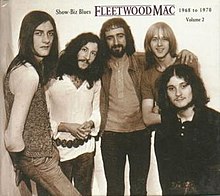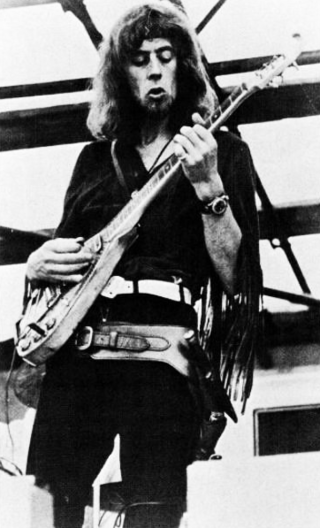
John Mayall & the Bluesbreakers are an English blues rock band led by singer, songwriter, and multi-instrumentalist John Mayall. While never producing a hit of their own, the band has been influential as an incubator for British rock and blues musicians. Many of the best known bands to come out of Britain in the 1960s and 1970s had members that came through the Bluesbreakers at one time, forming the foundation of British blues music that is still played heavily on classic rock radio. Among those with a tenure in the Bluesbreakers are Eric Clapton and Jack Bruce, Peter Green, Mick Fleetwood, and John McVie, Mick Taylor, Aynsley Dunbar, Jon Hiseman, Dick Heckstall-Smith and Tony Reeves, and numerous others.

John Mayall, OBE is an English blues singer, musician and songwriter, whose musical career spans over sixty years. In the 1960s, he was the founder of John Mayall & the Bluesbreakers, a band that has counted among its members some of the most famous blues and blues rock musicians.
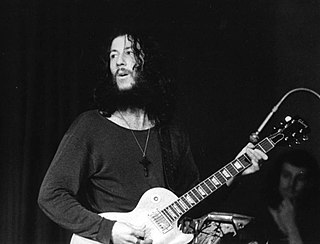
Peter Allen Greenbaum, known professionally as Peter Green, was an English blues rock singer-songwriter and guitarist. As the founder of Fleetwood Mac, he was inducted into the Rock and Roll Hall of Fame in 1998. Green founded Fleetwood Mac in 1967 after a stint in John Mayall's Bluesbreakers and quickly established the new band as a popular live act in addition to a successful recording act, before departing in 1970. Green's songs, such as "Albatross", "Black Magic Woman", "Oh Well", "The Green Manalishi " and "Man of the World", appeared on singles charts, and several have been adapted by a variety of musicians.

Fleetwood Mac, also known as Peter Green's Fleetwood Mac, is the debut studio album by British blues rock band Fleetwood Mac, released on 24 February 1968. The album is a mixture of blues covers and originals penned by guitarists Peter Green and Jeremy Spencer, who also share the vocal duties. It is the only album by the band without any involvement of keyboardist/vocalist Christine McVie.
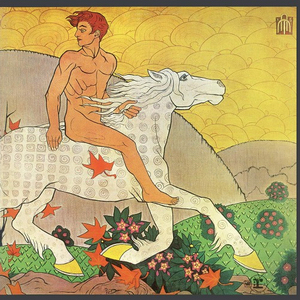
Then Play On is the third studio album by the British blues rock band Fleetwood Mac, released on 19 September 1969. It was the first of their original albums to feature Danny Kirwan and the last with Peter Green. Jeremy Spencer did not feature on the album apart from "a couple of piano things". The album offered a broader stylistic range than the straightforward electric blues of the group's first two albums, displaying elements of folk rock, hard rock, art rock and psychedelia. The album reached No. 6 on the UK Albums Chart, becoming the band's fourth Top 20 LP in a row, as well as their third album to reach the Top 10. The album's title, Then Play On, is taken from the opening line of William Shakespeare's play Twelfth Night — "If music be the food of love, play on".

Daniel David Kirwan was a British musician whose greatest success came with his role as guitarist, singer and songwriter with the blues rock band Fleetwood Mac between 1968 and 1972. He released three albums as a solo artist from 1975 to 1979, recorded albums with Otis Spann, Chris Youlden, and Tramp, and worked with his former Fleetwood Mac colleagues Jeremy Spencer and Christine McVie on some of their solo projects. As a member of Fleetwood Mac, he was inducted into the Rock and Roll Hall of Fame in 1998.

Live in Boston is a live album by British blues-rock band Fleetwood Mac that was first released in 1985.

Live at the BBC is a double compact disc compilation album by British blues rock band Fleetwood Mac, recorded at various BBC radio sessions between 1967 and 1971. It contains many tracks by Fleetwood Mac which are otherwise unavailable.

The Vaudeville Years of Fleetwood Mac 1968 to 1970 is an album by British blues rock band Fleetwood Mac, released in 1998. It was a compilation of outtakes and unreleased tracks from the band's early line up, none of which had previously been officially released. Available on double vinyl LP and double CD, it came with a booklet of extensive notes and anecdotes, and was the companion volume to Show-Biz Blues: Fleetwood Mac 1968–70, which was released a few years later.

Greatest Hits is a compilation album by the British blues rock band Fleetwood Mac released on CBS Records in the United Kingdom in 1971. The album assembles the band's hit singles in the UK covering the period from the band's beginning in 1968 to 1971, mostly in its original incarnation led by guitarist Peter Green. It peaked at No. 36 on the UK Albums Chart.

Blues Jam in Chicago is a recording by the British rock band Fleetwood Mac, originally released in two single-LP volumes by Blue Horizon in December 1969. It was the result of a recording session in early 1969 at Chess Records in Chicago with Fleetwood Mac, then a young British blues band, and a number of famous Chicago blues artists from whom they drew inspiration. The album has also been released, with slightly different track listings, under the titles Blues Jam at Chess Volumes One and Two and Fleetwood Mac in Chicago, the latter by Sire Records in 1976.

Crusade is the fourth album and third studio album by the British blues rock band John Mayall & the Bluesbreakers, released on 1 September 1967 on Decca Records. It was the follow-up to A Hard Road, also released in 1967. As with their two previous albums, Crusade was produced by Mike Vernon. The album was the first recordings of the then-18-year-old guitarist Mick Taylor.

The Biggest Thing Since Colossus is an album by American blues musician Otis Spann, released in 1969. The album is also notable for the fact that Spann's backing band on this occasion were members of Fleetwood Mac, who were touring in America at the time. Spann had been involved in the recording of the Blues Jam at Chess album, and a rapport had been struck between Spann and the British band, which led to their participation on Spann's new album.
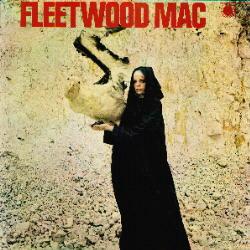
The Pious Bird of Good Omen is a compilation album by the British blues rock band Fleetwood Mac, released in 1969. It consists of their first four non-album UK singles and their B-sides, two other tracks from their previous album Mr. Wonderful, and two tracks by the blues artist Eddie Boyd with backing by members of Fleetwood Mac. These two tracks came from Boyd's album 7936 South Rhodes.

The Original Fleetwood Mac is a compilation album by British blues rock band Fleetwood Mac, first released in May 1971. It consists of various outtakes recorded by the first incarnation of the band in 1967–68. The album was re-released in 2000 with four extra tracks, and re-released in 2004 with seven different extra tracks.
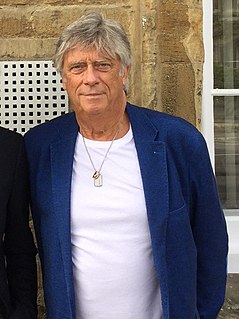
Michael William Hugh Vernon is an English music executive studio owner, and record producer from Harrow, Middlesex. He produced albums for British blues artists and groups in the 1960s, working with the Bluesbreakers, David Bowie, Duster Bennett, Savoy Brown, Chicken Shack, Climax Blues Band, Eric Clapton, Fleetwood Mac, Peter Green, Danny Kirwan, John Mayall, Christine McVie and Ten Years After amongst others.
Black Magic Woman is a compilation album by British blues rock band Fleetwood Mac, released in 1971. It is a double album, composed of songs from two Peter Green-era albums, Peter Green's Fleetwood Mac and English Rose, as well as several non-album tracks. The U.S. Epic double album contains a different cover photo of a gypsy woman.

Shrine '69 is a live album by British blues rock band Fleetwood Mac, recorded on 25 January 1969, and finally released in 1999. Recorded at a concert in Los Angeles, this album includes versions of the band's recent hits, "Albatross" and "Need Your Love So Bad", as well as more unusual songs like "Before the Beginning" and "Lemon Squeezer".
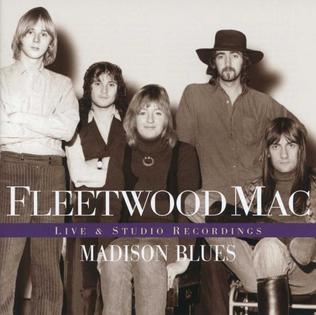
Madison Blues – Live & Studio Recordings is a compilation album by British blues rock band Fleetwood Mac, released in 2003. It is a compilation of BBC session tracks and live concert material from the band's first post-Peter Green line up, none of which had previously been officially released. It is unusual within Fleetwood Mac's catalogue as it focuses on the period between the successful Peter Green period and the start of the Bob Welch period which eventually led to another successful period for the band in the mid to late 1970s. Packaged as a double CD with a DVD interview with guitarist Jeremy Spencer, it came in a cardboard box with a foldout inner sheet.
"Rattlesnake Shake" is a song by British rock group Fleetwood Mac, written by guitarist Peter Green, which first appeared on the band's 1969 album Then Play On. The track was considered the high point of its parent album, and was one of the band's crowd-favorites in the late 1960s.
